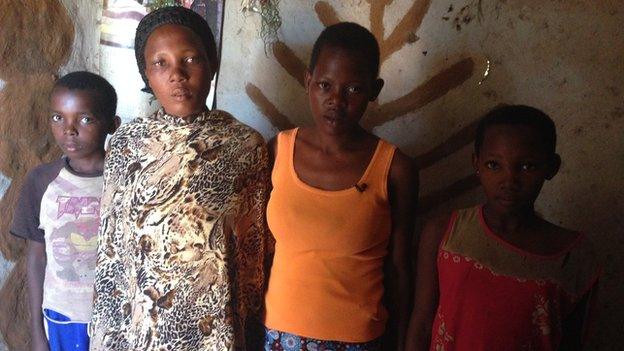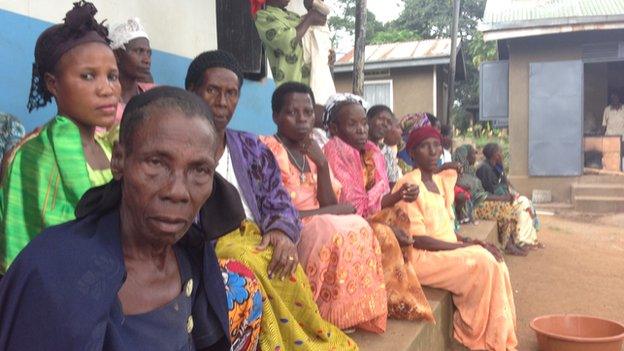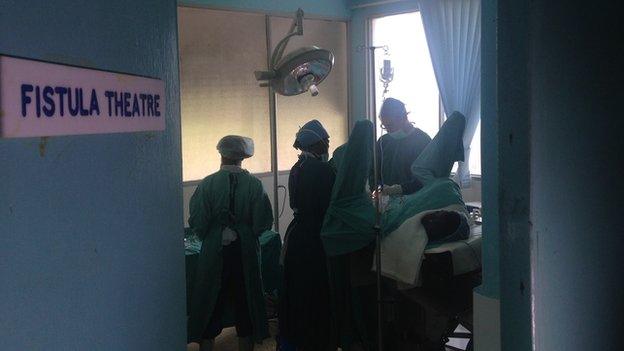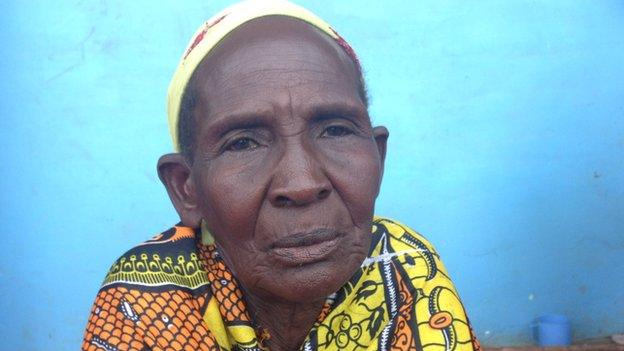The 'cursed' women living in shame
- Published

Sulaina with her family in the village of Serinya
In a rural central Ugandan village, 17-year-old Sulaina sits on the mud floor of the tiny home she shares with her mother and younger brother and sister.
She wants to help provide for her family. But she can't. She can barely leave her house.
Wherever she goes, a sickly smell follows her. That's because she is constantly leaking urine.
The rags she has stuffed in her underwear are drenched quickly, and then the urine starts running down her legs.
She has sores all over her thighs where the urine has burned her.
Sulaina has a condition called obstetric fistula. She developed it after giving birth to a baby girl last year.
Like so many women in rural parts of the country, she left it too late to get to hospital.
"I was in labour for two days, then on the third day I went to a clinic and gave birth there. I had a baby girl," she said.
"She died before I got to see her. I never even held her in my arms."
"Cursed"
Sulaina says she believes a neighbour cursed her and that's why her baby died and why she now has a hole in her bladder.
"My baby survived for two days but she had something pulling her away.
"When it left her the curse caught me. I felt as though black ants and termites were biting me. I would not be in this condition now if they hadn't bewitched me."

More than 70 women turned up to get free fistula treatment at Kitovu hospital in Masaka
Many people in such rural areas believe in witchcraft over medical science says Dr Florence Nalubega, a gynaecologist at Kitovu Hospital in Masaka.
Today she has teamed up with local popular radio DJs in the centre of Lwamaggwa village to talk about family planning and the importance of getting pregnant women to hospital to give birth rather than relying on traditional birthing attendants in the community.
She says these older women in the community have little or no medical training and don't know what to do when things go wrong. But many women trust them over doctors.
"Some people here have told me that we in the hospital actually cause fistulas by using catheters which we put in the bladder," says Dr Nalubega.
"They also think we do excessive operations like Caesareans. They think if they come to hospital they are going to get 'scissored'.
"They also use their own local plants like leaves from mango trees, they dry the leaves and then mix them with watered-down clay. They then drink it because they think it softens the (pelvic) bones and allows an easier birth."
It's these sorts of attitudes and beliefs health workers are trying to change. The other major obstacle for women giving birth safely and avoiding complications is money.
Getting to the nearest hospital can take hours and is expensive. Plus there is the cost of treatment on arrival. That's why a traditional birth attendant and herbal remedies, rather than expensive medicines, can seem like the better option.
Around 7,200 women die during or soon after childbirth in Uganda every year according the United Nations Population Fund.
The organisation's representative in Uganda Fundira Esperance said: "For every maternal death, six to 15 mothers survive with chronic debilitating ill health such as obstetric fistula.
"The face of fistula is represented by women who live in rural areas, are not educated and are within the lowest wealth quintile."
The organisation started an "End Fistula Campaign" in 2003 with the goal of making obstetric fistula as rare in developing countries as it is in the developed world.
But the surgery to repair fistula is complex and expensive. At around $700 it's completely out of the reach of those who need it.

Surgery can correct the condition
At Kitovo Hospital in Masaka, doctors from Chelsea and Westminster Hospital in London fly in for two weeks four times a year to provide free repair surgery for as many women as they can treat in that time period.
It is paid for by the hospital's health charity Borne which raises funds to pay for the treatment, hospital stay and transport costs for patients.
The doctors also train Ugandan medics to carry out the surgery. The hope is they will eventually be able to take over.
Around 70 women turn up in the first couple of days of the camp. Some have travelled long distances for treatment.
Sulaina is the first to have the surgery.
"I'm nervous" she says, "but I want this treatment so that I can go back outside and enjoy my life like others."
Specialised, difficult surgery
Shane Duffy is a consultant obstetrician and gynaecologist at Chelsea and Westminster Hospital and is carrying out Sulaina's surgery.
He has been heading the training and fistula repair camp at Kitovu Hospital for eight years.
"It's quite a specialised operation," he says.

Janet Nakanwagi has had 14 children and has been living with OF for 20 years
"It's a difficult operation and needs good equipment and good personnel to be able to support the surgeons.
"We have a local surgeon here at Kitovu who is able to do the simple fistulas, so she is starting to take them on.
"But unfortunately without the support of more senior doctors sometimes she feels a little bit anxious about doing the surgery. So unfortunately, not as much surgery happens after we've gone as we would like."
Uganda's health minister Ruhakana Rugunda says the government has a number of schemes providing free fistula treatment, but admits there is a long way to go to ensure this totally avoidable and treatable condition becomes a thing of the past.
"The prevalence of fistula is a reflection of the healthcare standards but also the economic status of the population.
"As we gradually improve services of care and the economy picks up, people can access health services more easily, then the incidence of fistula will come down."
After two hours in theatre, Sulaina returns from surgery.
The 4cm hole in her bladder has been repaired.
From today she will no longer have to walk around in a constant state of shame.
Her mother sits at her bedside stroking her hair.
"I am hopeful her future will be better now," she says.
"She was in such a bad way, but I have hope all will be well."
Watch Tulip Mazumdar's Newsnight film in full here